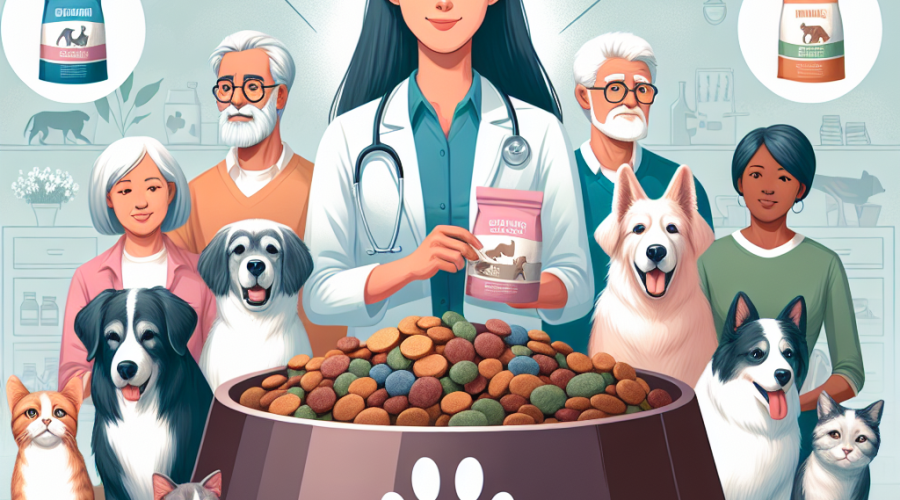Navigating the Nutritional Needs of Senior Pets: A Guide to Supporting Your Aging Companion’s Health
As our beloved pets enter their twilight years, their nutritional needs undergo a subtle yet significant metamorphosis. Just as humans require different diets at various stages of life, so do our furry friends. Navigating the nutritional landscape for senior pets can be akin to plotting a course through uncharted waters; it requires knowledge, care, and a touch of finesse.
Understanding the changes that occur in an aging pet is the cornerstone of providing the right dietary support. As pets grow older, their metabolism slows down, often leading to decreased activity levels and a propensity for weight gain. This begs the question: how do we tailor their diet to accommodate this shift without skimping on essential nutrients?
The first port of call is typically the vet’s office. A veterinary professional can offer invaluable insights into the specific needs of your pet based on their health, breed, and lifestyle. They can also identify any underlying health issues, such as kidney disease or arthritis, that may necessitate a special diet. It’s crucial to consider these factors when crafting a meal plan for your aging companion.
But it’s not just about what to feed your senior pet; it’s also about how to feed them. The texture and palatability of food can become increasingly important as pets age. Dental issues, for example, may make it harder for them to chew dry kibble. In such cases, wet food or softened dry food could be the key to ensuring they continue to enjoy mealtime without discomfort.
Portion control is another pivotal aspect of a senior pet’s diet. Overfeeding can lead to obesity, which comes hand in hand with a host of health issues, such as diabetes and joint pain. Conversely, underfeeding can result in weight loss and muscle wastage. The golden rule here is to feed your pet enough to maintain their optimal body condition, which can often mean smaller, more frequent meals.
Supplements can also play a role in supporting the health of senior pets. Glucosamine and chondroitin are popular additions for those with joint issues, while omega-3 fatty acids can help keep their coats shiny and support cognitive function. However, it’s essential to consult with your vet before introducing any supplements to ensure they’re necessary and won’t interfere with existing medications.
Hydration is a facet of pet care that’s often overlooked, yet it’s particularly crucial for older animals. Ensuring they have constant access to fresh water can help prevent urinary tract issues and aid in overall organ function. For some pets, incorporating wet food into their diet can also assist with maintaining adequate hydration levels.
Senior pets may also face challenges with digestion. Their gastrointestinal systems may not be as robust as they once were, leading to sensitivities or intolerances to certain foods. Probiotics and easily digestible proteins can be beneficial in these cases, helping to maintain a healthy gut environment and facilitating the absorption of nutrients.
The psychological aspect of feeding should not be underestimated either. Senior pets might experience changes in their senses of smell and taste, which can impact their interest in food. Keeping mealtime interesting with a variety of flavors and textures can help stimulate their appetite and ensure they look forward to eating.
Engagement with our aging pets during mealtime can also foster a sense of routine and reassurance. As pets age, they can become more reliant on the comfort and predictability provided by their human companions. By being present and attentive, you not only monitor their eating habits but also enhance the bond you share.
Supporting the health of senior pets through nutrition is a multifaceted endeavor that requires a blend of knowledge, observation, and compassion. It’s about more than just the food you put in their bowl; it’s about understanding their evolving needs and responding with care. By taking these steps, we can help our aging companions maintain their quality of life and enjoy their golden years to the fullest. After all, isn’t that what every pet parent desires for their cherished four-legged family member?
FAQs
Q: What dietary adjustments should be made for senior pets?
A: Senior pets often require diets lower in calories but rich in high-quality proteins and fibre to maintain muscle mass and support digestive health. It’s important to also incorporate age-appropriate levels of essential nutrients like omega fatty acids, glucosamine, and chondroitin for joint support.
Q: How can I tell if my senior pet’s diet is meeting their nutritional needs?
A: Observe your pet’s energy levels, coat quality, weight, and overall health; if you notice any concerning changes, consult your veterinarian to assess if their diet needs adjustment. Regular health check-ups are also crucial for monitoring the effectiveness of their nutrition plan.
Q: Are supplements necessary for senior pets, and if so, which are recommended?
A: Supplements can be beneficial for senior pets, particularly those containing omega-3 fatty acids for cognitive function and joint supplements like glucosamine for mobility. Always consult with a vet before adding any supplements to your pet’s diet.
Q: How does the hydration requirement change for aging pets?
A: Aging pets may be less efficient at conserving water, so it’s vital to ensure they have constant access to fresh water and consider wet food to increase their hydration intake. Monitor their water consumption and consult your vet if you notice any significant changes.
Q: What should I consider when choosing commercial food for my senior pet?
A: Look for commercial foods specifically formulated for senior pets that include high-quality protein sources, adjusted phosphorus levels for kidney health, and added prebiotics and antioxidants to support their immune system and digestive health. Always check for the AAFCO (Association of American Feed Control Officials) statement on the packaging to ensure the food meets the nutritional standards for senior pets.

